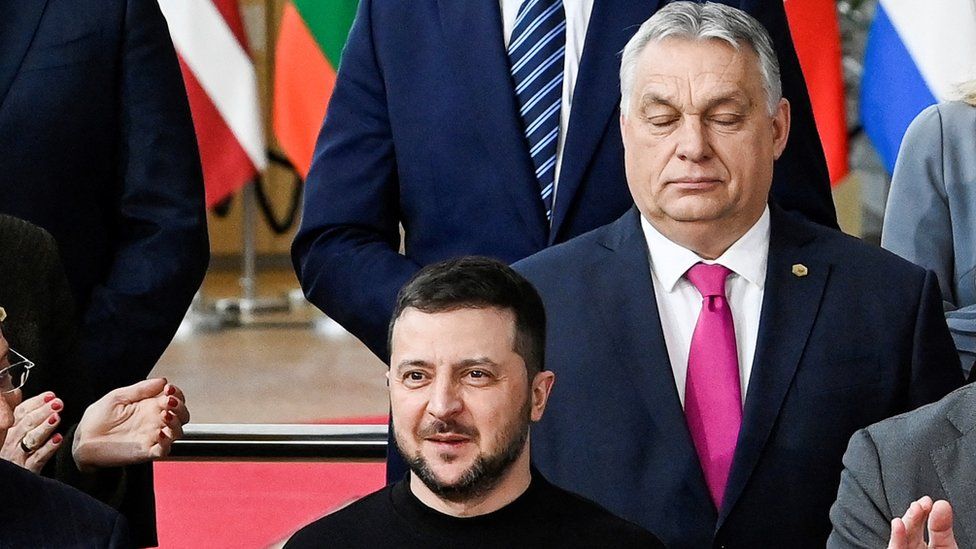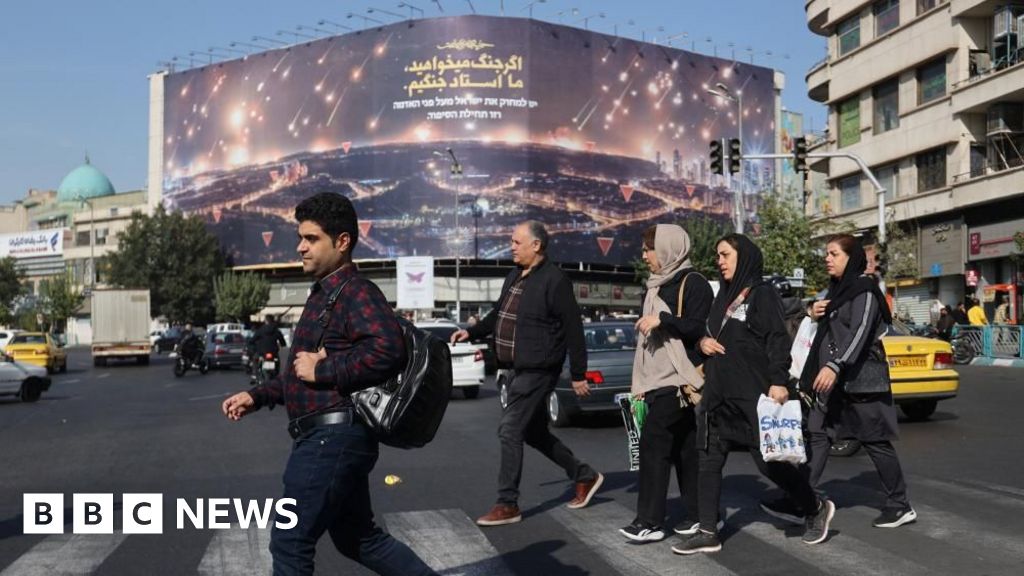ARTICLE AD BOX
 Image source, Getty Images
Image source, Getty Images
Viktor Orban avoids shaking hands with the Ukrainian president when Mr Zelensky attends EU summits
By Nick Thorpe
BBC News, Hungary
Hungarian Prime Minister Viktor Orban has warned he could "pull the handbrake" on future financial aid to Ukraine, after slapping a veto on a €50bn (£43bn; $55bn) EU package intended to help his neighbour survive the next three years.
It's not the first time he has stood in the way of his European Union colleagues doing their best to help Kyiv through Russia's full-scale war.
However, he did, grudgingly, let Ukraine and Moldova start formal negotiations on joining the EU, without actually supporting the idea. By walking out of the room he allowed the other 26 EU leaders vote for it unanimously.
He still declared it a "bad decision" that Hungary could stop any time in the future.
So what is Viktor Orban's problem with Ukraine?
He argues his position is both pragmatic and constructive, although there is clearly personal antipathy between him and Ukraine's president, Volodymyr Zelensky.
While other EU leaders queue up at the Brussels summit to have their photos taken with the Ukrainian leader, Mr Orban turns away.
Last weekend, Mr Zelensky was locked in intense conversation with Mr Orban when the two men attended the inauguration of Argentina's new president. What they said to each other is unknown.
Watch: Zelensky has animated chat with Orban this week in Argentina
Mr Orban seems rather more at ease with Vladimir Putin than with Mr Zelensky, and is the Russian leader's closest ally in Europe.
He has trodden a careful line in condemning Russia's invasion while steering clear of criticising its president, and recently became the first Western leader to meet him since April 2022.
"Hungary never wanted to confront Russia. Hungary always has been eager to expand contacts," Russian state TV quoted him as telling Mr Putin when they held talks in Beijing in October. Some reports suggested he even adopted Mr Putin's term for the war, "military operation".
The sight of an EU and Nato leader shaking hands with Vladimir Putin angered Mr Orban's Western allies. The US ambassador to Budapest complained that while Russia was striking Ukrainian civilians, "Hungary pleads for business deals".
Hungary's prime minister argues that Ukraine cannot win the war, and should therefore be persuaded by its allies to seek an immediate ceasefire, followed by negotiations.
He warned during the summer that Ukraine's counter-offensive would fail, and in that he has been proved right.
He has opposed EU sanctions on Russian oil and gas and refuses to allow EU or Nato military aid to enter Ukraine. He says supplying weapons to Kyiv just prolongs the agony.
Mr Orban took the decision to veto the latest package of economic aid for Ukraine, because he says Hungarian taxpayers' money should not go against their own interests.
He says membership for Ukraine in the EU would be a disaster for EU, including Hungarian farmers. It would also take away cohesion funds from Hungarians and others.
He sees Ukraine not as a future EU member, but as a buffer-zone between the EU and Russia. It is a view not so different from Vladimir's Putin's vision of a "neutral, demilitarised" Ukraine.
Image source, GRIGORY SYSOYEV/POOL/AFP
Image caption,Viktor Orban is viewed as an ally of the Russian president and met him in Beijing in October
One senior Hungarian diplomat told the BBC that the conflict in Ukraine was "an inter-Slav civil war", illustrating a tendency in Mr Orban's governing Fidesz party to view the world in ethnic terms.
Hungary has not been indifferent to the effects of Russia's invasion.
It has provided considerable humanitarian aid and helped hundreds of thousands of Ukrainian refugees on their way to other EU countries. Around 25,000 remain in Hungary and receive state support.
But Mr Orban claims that history often proves him right.
He points out that even his fiercest critics during the migration crisis of 2015-16 are now quietly adopting his policies, including building fences and trying to outsource asylum claims to countries outside Europe, including Rwanda, Libya and Tunisia.
Another plank of his government's policy is support for Hungarian minorities in neighbouring countries, including an estimated 100,000 in western Ukraine.
Dozens of Hungarians have been killed or injured in battle, fighting for Ukraine.
Thousands more have fled, or have not returned home from their jobs in the EU since the full-scale Russian invasion in February 2022.
Since 2017, the Orban government has been at loggerheads with Kyiv over a Ukrainian education law which made it increasingly difficult to study Hungarian in Ukrainian schools.
Playing tough, Mr Orban blocked meetings of the Nato-Ukraine commission.
Ahead of this week's EU summit, Ukraine passed a new law guaranteeing the right of Hungarians and other "EU nationalities" to speak and study in their own languages.
But the change was dismissed by the head of Hungary's governing Fidesz faction in Parliament, Mate Kocsis, as "cosmetic and of little weight".
Unofficial estimates suggest only 50,000 Hungarians remain in Ukraine, and hostility towards them is growing.
"Every time Orban opens his mouth, our situation gets worse," one former supporter of the Hungarian prime minister's hard line told the BBC in Mukhachevo, a centre of Hungarians in the Transcarpathian province of Ukraine.

 10 months ago
15
10 months ago
15








 English (US)
English (US)